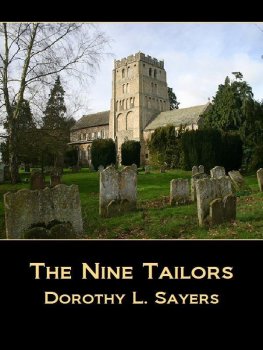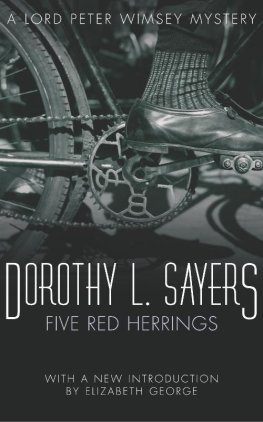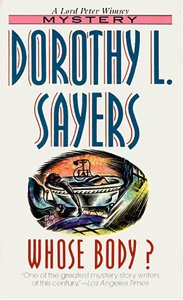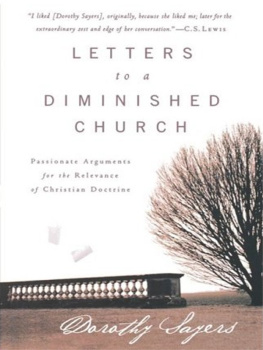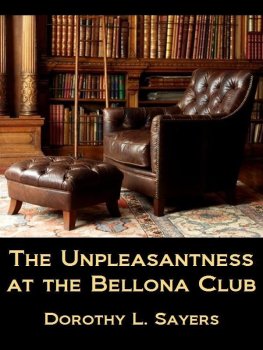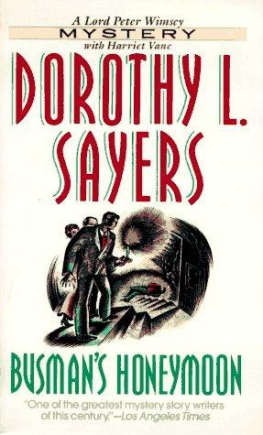Dorothy Sayers - The Nine Tailors
Here you can read online Dorothy Sayers - The Nine Tailors full text of the book (entire story) in english for free. Download pdf and epub, get meaning, cover and reviews about this ebook. genre: Detective and thriller. Description of the work, (preface) as well as reviews are available. Best literature library LitArk.com created for fans of good reading and offers a wide selection of genres:
Romance novel
Science fiction
Adventure
Detective
Science
History
Home and family
Prose
Art
Politics
Computer
Non-fiction
Religion
Business
Children
Humor
Choose a favorite category and find really read worthwhile books. Enjoy immersion in the world of imagination, feel the emotions of the characters or learn something new for yourself, make an fascinating discovery.
- Book:The Nine Tailors
- Author:
- Genre:
- Rating:5 / 5
- Favourites:Add to favourites
- Your mark:
- 100
- 1
- 2
- 3
- 4
- 5
The Nine Tailors: summary, description and annotation
We offer to read an annotation, description, summary or preface (depends on what the author of the book "The Nine Tailors" wrote himself). If you haven't found the necessary information about the book — write in the comments, we will try to find it.
The Nine Tailors — read online for free the complete book (whole text) full work
Below is the text of the book, divided by pages. System saving the place of the last page read, allows you to conveniently read the book "The Nine Tailors" online for free, without having to search again every time where you left off. Put a bookmark, and you can go to the page where you finished reading at any time.
Font size:
Interval:
Bookmark:
Dorothy L. Sayers
The Nine Tailors
Oxford-educated Dorothy Leigh Sayers (18931957) was one of the most popular authors of the Golden Age era. Born in England in 1893, Dorothy Sayers received her degree at university in medieval literature. Following her graduation, besides publishing two volumes of poetry, she began to write detective stories to earn money.
Her first novel, "Whose Body?" (1923), introduced Lord Peter Wimsey, the character for which she is best known. Wimsey, with his signature monocle and somewhat foppish air, appeared in eleven novels and several short stories. Working with his friend, Inspector Parker of Scotland Yard, Wimsey solved cases usually involving relatives or close friends.
Dorothy L. Sayers was well known for "combining detective writing with expert novelistic writing," and the imaginative ways in which her victims were disposed of. Among the many causes of death seen in her novels were, among others, poisoned teeth fillings, a cat with poisoned claws, and a dagger made of ice! (The Whodunit)
Dorothy Sayers also edited several mystery anthologies collected under the heading "The Omnibus of Crime" (1929), which included a noteworthy opening essay on the history of the mystery genre.
Later on in her life, Dorothy Sayers gave up detective fiction to pursue her other interests. She spent the last years of her life working on an English translation of Dante's Divine Comedy, having always claimed that religion and medieval studies were subjects more worthy of her time than writing detective stories

Dorothy L Sayers
Table of Contents
; THE BELLS ARE RUNG UP
: THE BELLS IN THEIR COURSES
: MR. GOTOBED IS CALLED WRONG WITH A DOUBLE
: LORD PETER IS CALLED INTO THE HUNT
: LORD PETER IS TAKEN FROM LEAD AND MAKES THIRD PLACE
: LORD PETER DODGES WITH MR. BLUNDELL AND PASSES HIM
: TAILOR PAUL IS CALLED BEFORE WITH A SINGLE
: MONSIEUR ROZIER HUNTS THE TREBLE DOWN
: PLAIN HUNTING
: LORD PETER FOLLOWS HIS COURSE BELL TO LEAD
: EMILY TURNS BUNTER FROM BEHIND
: LORD PETER IS CALLED WRONG
: THE QUICK WORK
: NOBBY GOES IN SLOW AND COMES OUT QUICK
: WILL THODAY GOES IN QUICK AND COMES OUT SLOW
: THE SLOW WORK
: THE DODGING
: THE WATERS ARE CALLED OUT
: THE WATERS ARE CALLED HOME
: THE BELLS ARE RUNG DOWN
FOREWORD
From time to time complaints are made about the ringing of church bells. It seems strange that a generation which tolerates the uproar of the internal combustion engine and the wailing of the jazz band should be so sensitive to the one loud noise that is made to the glory of God. England, alone in the world, has perfected the art of change-ringing and the true ringing of bells by rope and wheel, and will not lightly surrender her unique heritage.
I have to ask the indulgence of all change-ringers for any errors I may have made in dealing with their ancient craft. The surnames used in these books are all such as I have myself encountered among the people of East Anglia, but every place and person described is wholly fictitious, as are also the sins and negligences of those entirely imaginary bodies, the Wale Conservancy Board, the Fen Drainage Board and the East Level Waterways Commission.
My grateful thanks are due to Mr. W. J. Redhead, who so kindly designed for me the noble Parish Church of Fenchurch St. Paul and set it about with cherubims.
DOROTHY L. SAYERS
I.
A SHORT TOUCH OF KENT TREBLE BOB MAJOR
(Two Courses)
704
By the Course Ends
64352
23456
8th the Observation.
Call her in the middle with a double, before, wrong and home.
Repeated once.
(TROYTE.)
THE FIRST COURSE
THE BELLS ARE RUNG UP
The coil of rope which it is necessary to hold in the hand, before, and whilst raising a bell, always puzzles a learner; it gets into his face, and perhaps round his neck (in which case he may be hanged!).
TROYTE On Change-Ringing.
Thats torn it! said Lord Peter Wimsey.
The car lay, helpless and ridiculous, her nose deep in the ditch, her back wheels cocked absurdly up on the bank, as though she were doing her best to bolt to earth and were scraping herself a burrow beneath the drifted snow. Peering through a flurry of driving flakes, Wimsey saw how the accident had come about. The narrow, humpbacked bridge, blind as an eyeless beggar, spanned the dark drain at right angles, dropping plump down upon the narrow road that crested the dyke. Corning a trifle too fast across the bridge, blinded by the bitter easterly snowstorm, he had overshot the road and plunged down the side of the dyke into the deep ditch beyond, where the black spikes of a thorn hedge stood bleak and unwelcoming in the glare of the headlights.
Right and left, before and behind, the fen lay shrouded. It was past four oclock and New Years Eve; the snow that had fallen all day gave back a glimmering greyness to a sky like lead.
Im sorry, said Wimsey. Whereabouts do you suppose weve got to, Bunter?
The manservant consulted a map in the ray of an electric torch.
I think, my lord, we must have run off the proper road at Leamholt. Unless I am much mistaken, we must be near Fenchurch St. Paul.
As he spoke, the sound of a church clock, muffled by the snow, came borne upon the wind; it chimed the first quarter.
Thank God! said Wimsey. Where there is a church, there is civilisation. Well have to walk it. Never mind the suitcases; we can send somebody for them. Brrh! its cold. I bet that when Kingsley welcomed the wild northeaster he was sitting indoors by a good fire, eating muffins. I could do with a muffin myself. Next time I accept hospitality in the Fen-country, Ill take care that its at midsummer, or else Ill go by train. The church lies to windward of us, I fancy. It would.
They wrapped their coats about them and turned their faces to the wind and snow. To left of them, the drain ran straight as a rule could make it, black and sullen, with a steep bank shelving down to its slow, unforgiving waters. To their right was the broken line of the sunk hedge, with, here and there, a group of poplars or willows. They tramped on in silence, the snow beating on their eyelids. At the end of a solitary mile the gaunt shape of a windmill loomed up upon the farther bank of the drain, but no bridge led to it, and no light showed.
Another half-mile, and they came to a signpost and a secondary road that turned off to the right. Bunter turned his torch upon the signpost and read upon the single arm:
Fenchurch St. Paul.
There was no other direction; ahead, road and dyke marched on side by side into an eternity of winter.
Fenchurch St. Paul for us, said Wimsey. He led the way into the side-road, and as he did so, they heard the clock again nearer chiming the third quarter.
A few hundred yards of solitude, and they came upon the first sign of life in this frozen desolation: on their left, the roofs of a farm, standing some way back from the road, and, on the right, a small, square building like a box of bricks, whose sign, creaking in the blast, proclaimed it to be the Wheatsheaf public-house. In front of it stood a small, shabby car, and from windows on the ground and first floors light shone behind red blinds.
Wimsey went up to it and tried the door. It was shut, but not locked. He called out, Anybody about?
A middle-aged woman emerged from an inner room.
Were not open yet, she began, abruptly.
I beg your pardon, said Wimsey. Our car has come to grief. Can you direct us?
Font size:
Interval:
Bookmark:
Similar books «The Nine Tailors»
Look at similar books to The Nine Tailors. We have selected literature similar in name and meaning in the hope of providing readers with more options to find new, interesting, not yet read works.
Discussion, reviews of the book The Nine Tailors and just readers' own opinions. Leave your comments, write what you think about the work, its meaning or the main characters. Specify what exactly you liked and what you didn't like, and why you think so.

